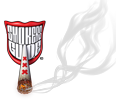Currently, over 100 cannabinoids have been discovered in hemp, the most prominent of which are tetrahydrocannabinol (THC) and cannabidiol (CBD). While CBD is legal as a treatment for various disorders, THC is illegal in most countries.
CBD is most often found in the form of an extract, and it is sold in tinctures, gums, oils, supplements, and much more. It is most often consumed by smoking, but it is also available in "edibles" and capsules. Both compounds affect the endocannabinoid system but have completely different effects. Keep reading to find out more about the benefits and the side effects of both CBD and THC.
1. What Is THC?
Tetrahydrocannabinol, also known as THC, is another compound of marijuana that has psychotropic effects. THC was first isolated by an organic chemist, Ph.D. Raphael Mechoularn with help from Yechia Gaonio and the rest of the team in Jerusalem, Israel.
THC in small doses has analgesic properties, which allows it to be used in the medical treatment of pain, with negligible side effects compared to other drugs of that nature. Its effects are most often manifested as euphoria, change in perception of time and space, the sensitivity of the visual, auditory, and olfactory nerves, relaxation, disorientation, fatigue, and increased appetite.
2. What is CBD?
CBD, is a non-psychotropic phytocannabinoid, legal, with excellent characteristics. It is another compound of the CBD plant with proven therapeutic benefits in treating various diseases and conditions.
It is extracted from the cannabis plant and used in many different products which are now available on the market. You can find CBD products in many different forms at FAB CBD on this link. All of them have different properties and if you are new at this it is best to start with small doses prescribed by your doctor.
3. The Main Differences
CBD products are very well tolerated and widely used around the world. If the product does not contain THC, it provides numerous benefits once a person gets used to its effects.
It should be noted that the effects of THC are stronger and most often negative, such as dry mouth, red eyes, nausea, and dizziness. The best thing is that all these effects do not last long and they disappear within just a few hours.
Although no compound is fatal, a large amount of THC can lead to long-term psychological consequences, which is especially true for adolescents. You can find products available with both CBD and THC and there are even some that contain both compounds in one product.
4. Legality
In particular, when we talk about cannabis we often refer to the THC compound, which is not legal in many countries. According to the Drug Enforcement Administration, even though some states have legalized marijuana for either recreational or medical purposes, the plant is still classified as a drug on the federal level, a classification reserved for substances with a high potential for abuse and no therapeutic value.
The legality of the plant's specific components, such as delta-8 THC, is ambiguous.
In accordance with that regulation, cannabis plants with 0.3 percent delta-9 THC or below, levels deemed insufficient to have a psychoactive effect, are referred to as hemp.
The measure does not, however, address delta-8 THC levels; as a result, it is legal for merchants to sell the substance, frequently in the form of edibles, vape cartridges, and tinctures, with no restrictions.
5. The Effects Of CBD vs THC
THC and CBD are both extracted from cannabis. THC is a substance with psychotropic characteristics, unlike CBD which, in addition to not being psychotropic, is also able to counteract the unwanted effects of THC. A further difference consists in the ability of THC, to bind to the CB1 receptor, present in the central nervous system, as opposed to cannabidiol which instead interacts with the CB2 receptor, present in various areas of the human body, particularly in the immune system.
SmokersGuide.com disclaimer:
SmokersGuide.com takes pride in featuring high quality articles to its readers, however does not assume liability for the claims and medical facts presented by the author. Please check with your doctor or medical practitioner, before consuming any products containing CBD, THC, herbs and Smart Products, or any other products recommended here. Make sure to always check for advised dosages, and please keep all THC and CBD products (including vapes, flowers, oils, concentrates or edibles) away from children, animals and any persons who may not desire to consume them. Make sure to clearly mark all products with warnings about the contents, and store all products in locked, child-proof containers, to avoid accidental ingestion. Please check your own country's laws regarding CBD and THC, and make sure shipping is allowed. SmokersGuide.com content is always created in countries where cannabis products are legal, for medicinal and/or for recreational uses. Smokers Guide does not encourage the use of cannabis in countries where its consumption is illegal.




 THC Vapes: What To Look For When Buying Online
THC Vapes: What To Look For When Buying Online  Essential Things To Consider Before Buying Cannabis
Essential Things To Consider Before Buying Cannabis  CBD Vs. THC: How To Incorporate Them Safely Into Your...
CBD Vs. THC: How To Incorporate Them Safely Into Your...  Marijuana 101: How to Tell the Difference Between Mold and...
Marijuana 101: How to Tell the Difference Between Mold and...  The best spots in Tanzania that you need to visit
The best spots in Tanzania that you need to visit  CBD vs THC: which one is right for you?
CBD vs THC: which one is right for you?  Dolato Strain Review
Dolato Strain Review  Your complete guide to indicas
Your complete guide to indicas 

